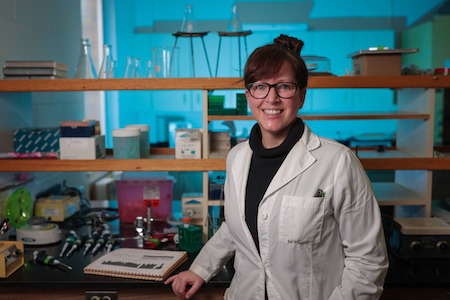Idaho State University Biologist Awarded $1.5 Million National Institutes of Health Grant to Fight Malaria
February 1, 2022

An Idaho State University researcher is getting a big boost to battle one of the world’s most deadly parasites. Recently, Dr. Kristin Lane, Assistant Professor of Molecular Microbiology and Biochemistry, was awarded a $1.5 million New Innovator Award from the National Institutes of Health to study Plasmodium falciparum, the most deadly of the parasites that cause malaria.
Specifically, Lane will be looking at the mitochondria of P. falciparum for ways to defeat the microbe.
“Currently, we don’t know how the mito-genome - the DNA in the mitochondria - is regulated or how the genes are expressed. What we do know is those processes are critical for the parasite’s survival,” said Lane. “What my research will hopefully tell us is how the parasite repairs its mito-genome when damaged, how the mito-genes are expressed, and how these processes work. The findings will help identify new targets in the mitochondria for vaccines and medicines so that the parasite can't evolve and gain resistance.”
According to the Centers for Disease Control and Prevention, “malaria is one of the most severe public health problems worldwide. It is a leading cause of death and disease in many developing countries, where young children and pregnant women are the groups most affected.” Additionally, “in 2020, an estimated 627,000 people died of malaria—most were young children in sub-Saharan Africa.”
“P. falciparum parasites have rapidly developed resistance to all the drugs we've deployed in the field to treat infections,” Lane said. “For several drugs, resistance was identified in the first year they were used. Given the global morbidity and mortality, there's an urgent need to identify new targets for treatment.”
“Dr. Lane's work on identifying targets for drugs to treat malaria is the kind of work that excites students and opens their minds to see the many possibilities that exist when they get their degree,” said Dr. Janet Loxterman, Professor and Biological Sciences Department Chair. “Whether students are going to medical school or doing research, they can contribute to improving human health in so many ways. We are fortunate to have Dr. Lane as a member of our Department.”
The New Innovator Award “supports a postdoctoral or newly independent Early Stage Investigator of exceptional creativity who proposes novel, original and insightful research concepts with the potential to produce a major impact, test scientific paradigms, or advance key concepts on broad, important problems in biomedical research.”
“We are proud of Dr. Lane for earning this prestigious award,” said Dr. Scott Snyder, Dean of ISU’s College of Science and Engineering. “NIH New Innovator Awards are among the most competitive of all NIH grant competitions, and Kristin's award demonstrates both her accomplishment as a scientist and her potential. More importantly, her work addresses one of the most deadly parasitic organisms on the planet and will help to treat and eventually eliminate malaria.”
Over the next five years, the grant will help fund two graduate-level researchers at ISU and a postdoctoral position. The funds will also allow Lane’s lab to purchase equipment and materials for the research.
“This grant will allow graduate and undergraduate researchers in my lab at ISU to do rigorous, cutting-edge research that will improve the lives of millions of children and adults around the world,” Lane said.
For more details on =Lane’s research, visit kristinlanelab.org.
For more information about the ISU Department of Biological Sciences, visit isu.edu/biology
Categories:
